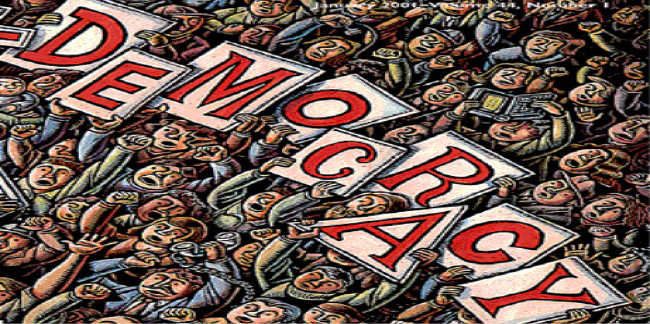Following the downfall of the Taliban’s regime, Afghans dreamt of a democratic society where they could exercise their rights and liberty. It was believed that Taliban’s fall marked the end of militancy in the country and Afghans would be able to live a peaceful life. However, the Taliban’s ragtag militants resurfaced and ushered in spilling the blood of people indiscriminately.
Democracy and human rights were supported to a great extent in the post-Taliban Afghanistan. Freedom of expression, which was strongly suppressed during the Taliban’s regime, emerged and all individuals and social activists are able to express their thoughts and feelings. Afghan Constitution was approved to advocate the rights and dignity of people and put an end to discrimination, injustice, and atrocities. Recognizing the Universal Declaration of Human Rights (UDHR) and the United Nations Charter, the post-Taliban constitution is a highly significant landmark in the history of Afghanistan. This constitution is based on democratic principles and supports the rights and liberty of each individual regardless of their race, color, and creed. The constitution states in article 6, “The state shall be obligated to create a prosperous and progressive society based on social justice, preservation of human dignity, protection of human rights, realization of democracy, attainment of national unity as well as equality between all peoples and tribes and balance development of all areas of the country.” It supports the “inviolable” rights and dignity of people, freedom of thought and expression, democratic discourse, etc.
On the other hand, conducting presidential and provincial elections was also the elements of democracy. Unlike the Taliban’s dictatorial regime, the public will was held significant in the government’s body and Afghans were bestowed suffrage. Afghans celebrated democracy through flocking to ballot boxes with the hope of having a civil and peaceful society where no one could violate their rights to life, liberty, or property. Similarly, a large number of Afghan refugees returned to the country with a strong sense of hope. They believed that their blood would no more be spilt under a democratic state and they would live a peaceful life.
Nonetheless, the lull in militancy did not last long and the Taliban guerilla fighters resurfaced. They carried out large-scale attacks spilling streams of blood, which was a strong blow to Afghanistan’s nascent democracy. The conflict was ushered across the country and people sustained heavy casualties, which shattered their hope.
Within the past years, Afghans fluctuated between fear and hope. They hoped and prayed that Afghan government and its international allies would win the war on terror or at least bring the Taliban outfit to the peace table. During Hamid Karzai’s government, the Taliban played the game in a foul way. Their precondition, which was releasing a number of Taliban’s prisoners, was met but they refused to come to negotiating table. After all, Afghans hoped that the High Peace Council (HPC) would be able to persuade the Taliban to hold talks so that people no more suffer from insecurity.
Despite the public hope for a peaceful life and democratic society, the insurgency continued up to now. To the unmitigated chagrin of the public, Afghans’ rights and liberty were violated flagrantly as a result of escalated militancy. The Taliban insurgents, along with many other terrorist networks, showed no respect to human rights or democratic discourse. They respected neither national laws nor international instruments. Their harsh practices and radical mindset left no room for democracy. Through targeting civilians and killing them on the grounds of their race, color, and creed, the militants trampled upon Afghan constitution. To repress democracy in a stronger way, the militants sliced up some individuals’ fingers, which were inked during the election. Hence, the cruel practices of the militants did not only slow down the process of democratization but also shattered Afghans’ hope for a peaceful society.
Although militancy was the main obstacle before democracy, corruption in the government’s machinery and political cleavage between officials also hampered democratization. Corruption, mainly in judicial system, impeded the implementation of constitution and injustice did not come to an end. Political tension in the government’s machinery also took its toll on people and outshined national interests. In brief, Afghans believed that they would have a prosperous life under a democratic state, but all this issue narrowed the room for democracy.
To sum up, democracy did not take root in Afghanistan as a result of militancy, corruption in the government’s body, and political tension. The dream of Afghan people for a democratic society did not come true since the militants continued their insurgency and violated the rights and freedom of people without hesitation. Thus, this nascent democracy is also exposed to threat and peaceful life still remains a dream.
Home » Opinion » Democracy – An Afghans’ Dream Never Come True
Democracy – An Afghans’ Dream Never Come True
| Hujjatullah Zia

